Apple's iPhone 4: Thoroughly Reviewed
by Brian Klug & Anand Lal Shimpi on June 30, 2010 4:06 AM EST- Posted in
- Smartphones
- Apple
- iPhone 4
- Gadgets
- Mobile
Performance
When the 4 was announced, my curiosity (and perhaps yours as well?) was about the flavor of Apple’s A4 SoC inside the phone. The rumor was that the A4 in the iPhone 4 had a full 512MB of memory, compared to 256MB in the iPad’s A4. iFixit took an iPhone 4 apart (with relative ease I might add) and confirmed the presence of 512MB. Look at the A4 in this picture, the Samsung part number on the right edge of the chip starts out K4X4G. The K4X denotes a Samsung mobile DRAM and the 4G refers to its density: 4Gbit or 512MB.
More memory should mean a smoother multitasking experience on the iPhone 4. Remember that iOS 4 keeps all fast task switching enabled apps resident in memory even after you’ve switched away from them. They are only kicked out of memory if you run low or if you force quit them. With more memory you should be able to keep more apps in memory without unwillingly forcing them out. The 512MB of RAM should also give the OS more breathing room in lighter multitasking scenarios, a problem many are already seeing on the iPhone 3GS running iOS 4. In practice the 4 is smoother when running iOS 4. There are still some hiccups but not as bad as on the 3GS, and definitely not as bad as on the 3G. The OS was clearly designed with the iPhone 4 as the performance target.
The big question that remains is what clock speed the iPhone 4’s A4 is running at. The assumption was 1GHz however Apple was very careful not to mention clock speed, unlike at the iPad launch. Saying nothing usually means there’s nothing good to say.
I ran a whole bunch of benchmarks on the iPhone 4 and the iPhone 3GS running iOS 4 to try and figure out what CPU speed we might be dealing with. The early reviews imply that the A4 in the iPhone 4 is running at a speed greater than the 3GS’s 600MHz, but slower than the iPad’s 1GHz. Let’s try and find out what it’s really running at.
We’ll start with the real world tests, first SunSpider. A javascript performance test this benchmark is completely network independent but it measures the performance of the browser as well as the underlying hardware. It is small enough to make memory size differences negligible so between the two iPhones we should be seeing a pure CPU comparison:
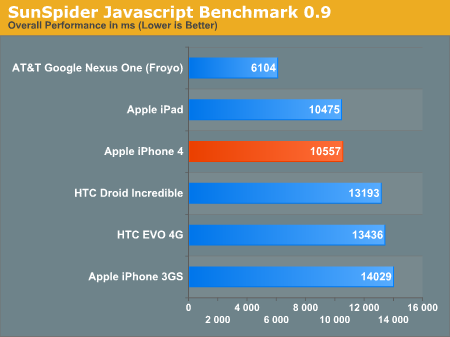
The iPhone 4 manages a time that’s 25% faster. Note that this test is just as much about the software stack as it is about CPU/platform performance. The Froyo update makes the Nexus One ridiculously fast in this benchmark. It just shows you how much room there is to improve performance on these Android handsets. The next leapfrog is going to be once the entire Android world moves to 2.2.
Next up is the Rightware BrowserMark. This test combines JavaScript and HTML rendering performance:
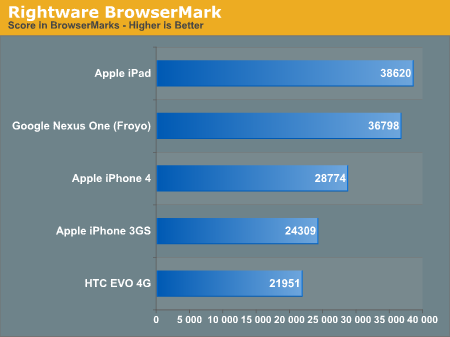
BrowserMark spits out an overall score but with no indication of what the score actually means. In this case we’re looking at 18.4% better performance than the iPhone 3GS. The iPad is 34% faster than the 4, which supports the theory of the A4 running at ~750MHz in the new iPhone.
There's also the possibility that the A4 CPU clock varies depending on load and other factors but the run to run consistency in all of our tests seems to indicate otherwise. We also can't ignore the fact that the iPad and iPhone now run vastly different OS revisions. In some cases iOS 4 actually takes a step back in performance compared to iOS 3.2. That undoubtedly makes the iPad vs. iPhone 4 comparison about much more than CPU performance.
Froyo's improved Javascript performance sends the Nexus One nearly to the top of the list here, only bested by the iPad. While Apple has definitely improved performance with the iPhone 4, it seems that it will only take a software update for Android phones to surpass it.
To measure web browsing performance I downloaded a bunch of different web pages and saved as much of them as possible locally on a server. I used WiFi on all of the devices to connect to my local server and timed average load time. I repeated the test at least 3 times and threw out any unusually high or low numbers. Performance was from a clean restart with no additional programs running in memory.
Note that these numbers aren't comparable to other reviews as we've updated software versions on two of the phones. The iPhone 3GS is now running iOS 4 which resulted in some numbers going up while others went down. And the Google Nexus One is running the officially released build of Android 2.2, codenamed Froyo.
What these tests should show is the overall performance of the platform when all network bottlenecks are removed. Obviously hiding in a tunnel under a lead umbrella will make any phone slow, but we’re looking at peak performance here.
The first test is the new AnandTech front page. Here we’ve got tons of images and HTML, meaning we’re stressing both bandwidth and code parsing speed.
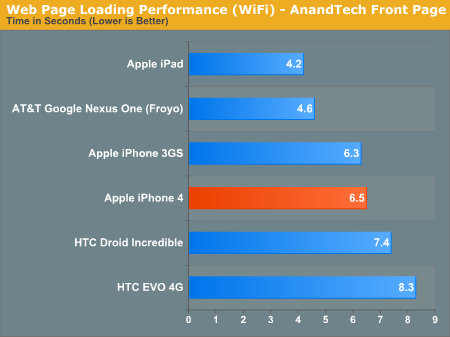
The iPhone 4 is no faster than the 3GS (actually slightly slower, but we'll chalk that up to timing variance) here. The Froyo update to the Nexus One makes it lightning quick, almost as fast as the iPad in our first test.
Next up we have the first page of our recent Zotac XBOX HD-ID11 review. The balance shifts from tons of images to more HTML processing:
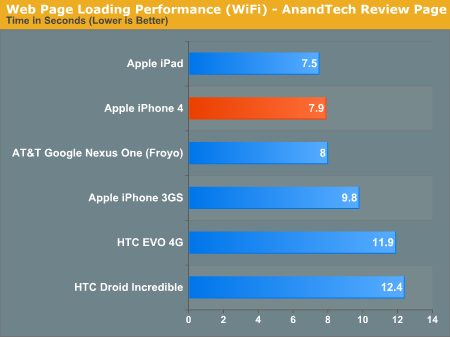
Here we see more of what I expected: the iPhone 4 is around 25% faster than the 3GS running iOS 4. Android 2.2 running on the Nexus One is basically as fast as the 4.
Using our Print this Review function, this next test loads our entire 2010 15-inch Macbook Pro review. While the other two tests had some flash ad content, this one is completely devoid of it so the HTC phones shouldn’t be penalized:
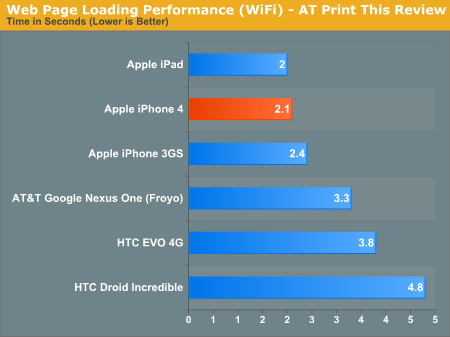
Here the iPhone 4 is 11% faster than the 3GS and about the speed of the iPad. There are other bottlenecks at play here so we don't get further performance scaling. The Froyo update helps the Nexus One a bit but the iOS devices are still quicker.
Our most intensive test is up next with a load of the Engadget front page:
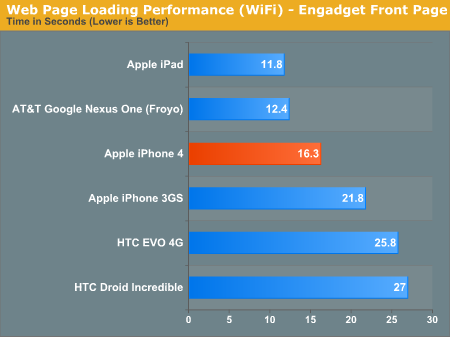
The Nexus One is ahead of the 4 once more with its Froyo update. And the iPhone 4 is 34% faster than the 3GS.
Our most CPU bound test is up next. I put together a custom page with a ton of tabular content and a single page copy of our 15-inch MBP review to make the load take some time at least.
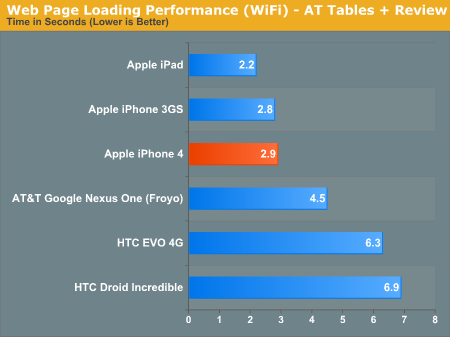
Surprisingly enough there's no difference between the 3GS and the 4 here, perhaps my test is less CPU bound than I thought. Froyo improves the Nexus One's performance a little bit.
Low Level Synthetic Tests
If we assume that we’re mostly CPU bound in all of these cases (a fair assumption given how fast Atom can run through all of these tests), then we’d be looking at a ~750MHz clock speed for the iPhone 4’s A4 assuming no other architectural changes. That’s actually a pretty big assumption. The A4 is widely believed to be a 45nm SoC using an ARM Cortex A8. At 45nm there should be room for a larger L2 cache than what was used in the iPhone 3GS’s SoC.
Perhaps some more synthetic tests will help us figure out what’s going on. I turned to Geekbench, now available in an iOS version.
Geekbench spit out a number of overall results that gave me a good enough summary of what’s going on to make an educated guess:
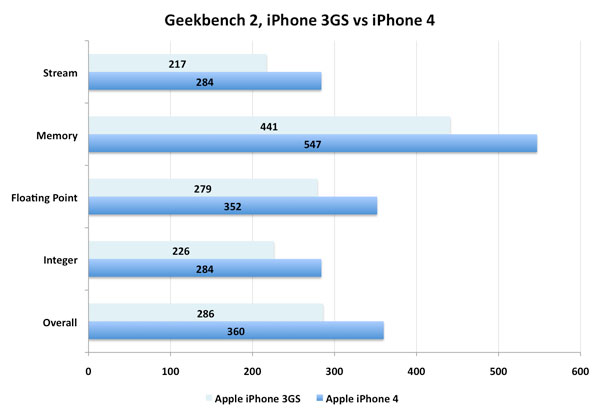
The CPU specific tests all indicate the iPhone 4 is around 25% faster than the iPhone 3GS. That would imply at least a 750MHz clock speed if all else is the same. Assuming we don’t get perfect CPU scaling with all of these tests, I’d venture a guess that 800MHz is more accurate. If the A4 does indeed have larger caches however, Apple could get away with a lower clock speed.
The memory results are particularly telling as they all scale very well going to the iPhone 4, better than the CPU results in fact. This could lend credibility to the theory of larger internal caches or perhaps to an improved (faster) memory subsystem.
Unfortunately until we get the iPad on iOS 4 we can't get a better idea of CPU scaling. I'm not even sure how reliable that will be at this point. If Apple was willing to change the amount of memory the A4 package housed between the iPad and iPhone 4, who is to say that it wouldn't have a slightly different design for the iPhone 4 (e.g. larger caches). The designs may not be physically different but we may instead be looking at binning. Given Apple's unwillingness to talk about the architecture here I think the safest bet is that we're looking at an 800MHz ARM Cortex A8 core in the iPhone 4 and a 1GHz core in the iPad.
Why the lower clock? It's all about battery life.










270 Comments
View All Comments
Stuka87 - Wednesday, June 30, 2010 - link
Yet another top notch, in depth review Anand. I love the amount of depth you add to any review.One question, on the first page you refer to the SoC used in many Android devices as "Scorpion" rather than "Snapdragon." Is there an actual difference, or just different names for the same device? Or perhap Scorpion is more specific to the revision?
I am still thinking that for now I will keep my 3GS. next year when its time to upgrade, a new better iPhone will be out anyway.
Spoelie - Wednesday, June 30, 2010 - link
Scorpion is the CPU, Snapdragon is the entire SoC (with gpu etc etc)brandonicus - Wednesday, June 30, 2010 - link
Still reading the review, but from the first page pictures I have to ask...Did you already scratch your iPhone to hell? When seeing the front side comparison with the Nexus One I thought the iPhone looked terrible. Bad pictures? Or does it just scratch really easy?...I'm sure later in the review I'll read that you threw it on the ground a few dozen times :)ipredroid - Wednesday, June 30, 2010 - link
Many of your in-depth reviews have helped me decide on how to customize/purchase/learn about a product. Nevermind people saying you (Shimpi) are bias towards a product. People are just annoyed at anything Apple related because the media won't shut up about Apple. I realize you are smart enough not to respond to random haters and treat those here with respect and even respond to comments or questions. Thank you to the AnandTech team!The0ne - Wednesday, June 30, 2010 - link
Don't be a fool, many of us here are here at Anandtech because first many of us do like Anadtech ever since he started his site, secondly the reviews are good in general and lastly because most of us are either engineers or in the computer related field.What most of us criticized are valid to some extent. What I've criticized is immensely valid. Do the test and write the review without any type of unjustified opinions included. And if it's not too much trouble be CONSISTENT. I don't go around testing similar products every which way. I'm not saying Anandtech does this all the time but I get really annoy when things are not consistent from one review to the next; meaning testing was not consistent and thus results could be dark matter for all I know.
ipredroid - Wednesday, June 30, 2010 - link
You Proved my point, you randomly hated on a general comment I made, (which I made to no one in particular). No one here is a fool. Base your opinions off of facts not general assersens of which you are speculating. Misplaced criticism based on speculation is for tabloids. Which is unfortunately how you come across when you call people fools and bash with out facts. I'm sure you realize how Hypocritical you are being. You are entitled to your opinion of course but your ignorance shows when you don't base off of facts. (Referring to antenna issue) Apple and Google are both guilty of faulty antennas saying either company's engineers didn't test properly is just silly.The0ne - Thursday, July 1, 2010 - link
Your comprehension is misplaced. When I called you a "fool" it was in referenced to you saying."Nevermind people saying you (Shimpi) are bias towards a product. People are just annoyed at anything Apple related because the media won't shut up about Apple. I realize you are smart enough not to respond to random haters and treat those here with respect and even respond to comments or questions. Thank you to the AnandTech team!"
In short you are saying that some of us that have differing opinions on the subject matter are idiots and that Anand is smart to avoid us and our lame comments. That is pretty much your entire take on it. All I'm saying is that there are many professionals as members here on Anandtech, many of which are very intelligent. Assuming we're that dumb is foolish, and hence the use of the word "fool."
I'm sorry, this Antenna issue is a laughing stock to any respectable engineer. If could have only gone into the finish product by decisions made against the respectable Engineer(s). Whether you choose to believe otherwise is irrelevant because the FACT remains the problem is a basic one. Whether it's Apple, Google or our company is irrelevant as well. The discussion here is Apple iphone, thus the blame is directed at Apple. That does not imply it is ONLY Apple that does this.
And lastly where do you get off telling me I'm ignorant because of my "hate." Where is this hate you are talking about? You're making things up to justify your own means to have something to say to me, less the lack of comprehension in the first place. As for what I've said, that is very general. Why is asking "Do the test and write the review without any type of unjustified opinions included" full of hate?
Sorry you got the wrong idea of my original response.
ipredroid - Thursday, July 1, 2010 - link
I never said you were ignorant because of your hate... read it again... lol. Ignorant for calling me a fool and baseless facts (thank you for the apology). I even stated you ( everyone is) entitled to their opinion. Just stating some people comes across as "haters". People complain about everything, it is easier to see the bad rather than the good, human nature maybe.Anyways, I could careless, meant it as a thank you of sorts to the AnandTech team. Not to belittle other bloggers posts. To the overly negative with out sensible reasoning, yes. You, no. I enjoy reading others posts and rarely comment. I did this time because work put into the review by the AnandTech team seemed to be under appreciated in this review and I commented.
Of course anyone that runs a business isn't going to respond to distasteful posts rudely that wouldn't be smart. Not that those who are "haters" are idiots, even though they certainly can be.
IKeelU - Wednesday, June 30, 2010 - link
I liked the review. It seemed objective to me and I appreciate that the phone and OS were covered separately.Something that wasn't addressed: will the straight edges of the iPhone4 cause damage to one's pants (or one's purse)? My old Sony Ericsson candybar phone actually caused damage to the lining of my left pocket after several months of use. It seems like the iPhone4's edges are the sharpest-ever in a phone...
Though I must disagree about the iPhone 4 making the N1 look dated. In those photos, at least, the N1 looks way sexier to me.*
* I own an N1 ;)
tdream - Wednesday, June 30, 2010 - link
First of all calling the iphone 4 styling uptodate just because its new doesn't make any sense. Jobs says its like an OLD Lecia camera... The 3GS doesn't look dated in the objective sense. If you were to place these two devices in a test, a control group and another which was bombarded with marketing spiel (like the world has) you would get a vastly different viewpoint. Sharp edges are out, just because Apple have run out of ideas decided to be different doesn't mean it's better. Eg glossy vs matte, Apple have made matte cool again... even though all of my monitors are matte. Apple will do anything to be different and stand out, doesn't make it better though.Once again you ignore your own data and say the IPhone 4 is better than the 3GS even though in every case you tested it CLEARLY isn't. It a problem, you know it, Apple knows it, and now everyone in the world knows it. You "feel its better", well then if you feel it then I must feel it too right. Glad we live in a world which values science and facts too. Sorry but you're falling into Apple's main ploy right here, it's magical...
However the rest of your article remains fairly objective and up to your old high standards.